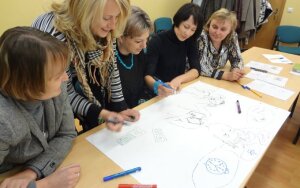- December 13, 2012
- 432
The new government about national minorities

Embassy of the Republic of Poland and the charity foundation of The House of Polish Culture in Vilnius, The Polish Educational Society and Psychological Centre of the region of Vilnius during October and December this year, have organized and conducted a series of trainings for teachers and headmasters of Polish schools from Vilnius. The aim of these courses was to develop interpersonal skills.
During the training courses, the students had an opportunity to develop the psychological skills that may be useful in everyday work at school. All the courses were based on real situations that teachers and headmasters have in their jobs.
The trainings covered three topics: “Interpersonal communication in teaching and education”, “Handling conflicts at school” and “Effective dealing with stress in the teaching profession”.
The courses took the form of workshop where participants were fed with theoretical knowledge and also made some practical exercises which were recorded on video camera or taped on dictaphone, so that they could analyze the material. The participants had also the possibility to work on their own or in group, to do the tests and to discuss different topics.
The participants said that both the quality and the usefulness of these training in career life were very high. Danuta Stepanowicz was asked to sum up the course “Interpersonal communication in teaching and education” and that is what she wrote: “I am very glad that I’m here, on this course. I like it for so many reasons. The main is that the schedule is really good prepared. Each exercise was educated, instructive, and interesting. We were not the passive students of boring lecture but we participated actively in lessons. Among the students there were education staffs, headmasters and their deputies, teachers from both schools and kindergartens. Each of us have a contact with adult people as well as with children. But, indeed, we impose the topics for discussion, ask students to answer, decide who can talk and who has to sit in silence. During the workshops we changed our roles. It was very beneficial to feel like a student, to feel his fear before public speech. I know lots of adult people for whom speaking to an audience, to the camera or in public is really horrible. That’s all because they simply just do not know the methods and rules of effective communication. When we summarized the speeches of our colleagues, we discussed their mistakes. I’m sure that during the preparation for public speech all the points will be taken into account.
How difficult and important at the same time was the exercise where we had to say positive aspects of our and our friends characters. When you are a teacher, you should just seek for mistakes and correct them. We can say something nice about gifted student but it is almost impossible to say it about less clever one. Only “varmint”, “dunce” etc. We should bear in mind that if a child is not as clever as their friends, have some problems with learning, does not mean that he is a person of second-rate. Maybe he likes animals, works on a farm or kneads something in wood.
I think that aims of these courses were achieved both from theoretical and practical points of view. We spent our time in a creative way which helped us to believe in our ability, gain more confidence in different situations. I would like to thanks so much for organizers for an actual and still needed curriculum.”
The other student, Honorata Ruskań, wrote: „I like so much the course in which I took part. It was professional and interesting. Many of the exercises made us think and forced us to cooperate with others, and, of course, did not allow us to get bored. The trainer created a nice atmosphere which helped us to understand the information. The good side was that we could ask questions, express our opinions which was connected with the subject of interpersonal communication. During the course, I got to know very important and useful facts which I am going to use in my pedagogical career.”
After each course the participants were asked to sum up the usefulness of the information, the preparation of organizer, and the organization matter. The average mark was very high – 4.8 out of 5.
The courses consisted of three one day lessons which lasted eight hours. The lessons were conducted for the groups of 10 to 15. There were overall 16 courses, and 277 people took part in it.
The trainers were the psychologist Roman Juchniewicz and the profesor Waldemar Chorościn. Today Roman Juchniewicz is the head of the Psychological Centre of the region of Vilnius, he conducts lectures and courses for over 15 years. Waldemar Chorościn is a graduate of Faculty of Journalism and Political Science atUniversity of Warsaw. He is experienced in working at leading position in business, he also helps people, conducts training, for about 15 years.
The organizers hope to make this project again in next year
Tłumaczenie Diana Omiljaniuk w ramach praktyk w Europejskiej Fundacji Praw Człowieka, www.efhr.eu. Translated by Diana Omiljaniuk the framework of a traineeship programme of the European Foundation of Human Rights, www.efhr.eu.

